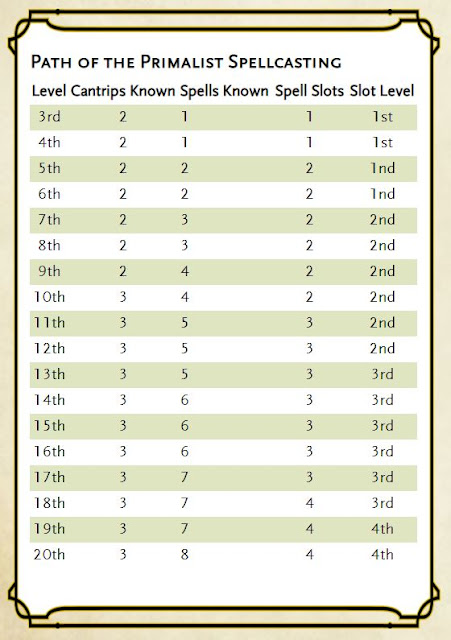The Spirit of Primal Fury
Some barbarians are able to be so overcome with rage, that connection to magic beyond the physical world is made. This is the way of the Primalist. Through raw emotion and rage, these barbarians are able to call forth powerful magic to aid them and bolster their abilities in battle.
These barbarians learn very few spells, but are able to cast them at full power.
Spellcasting
When you reach 3rd level, you can channel your emotions to cast spells. See chapter 10 for general rules of spellcasting.
Cantrips
You know two cantrips of your choice from the druid spell list. When you reach 10th level, you learn an additional cantrip of your choice.
Spell Slots
The Path of the Primalist table shows how many spell slots you have. The table also shows that the level of those slots is; all of your spell slots are the same level. To cast one of your barbarian spells of 1st level or higher, you must expend a spell slot.
Spells Known of 1st Level and Higher
At 3rd level, you know one 1st-level spell druid spell of your choice. You must choose from transmutation or evocation spells on the druid list.
The Spells Known column of the Primalist Table shows when you learn more spells of your choice of 1st level and higher. A spell you choose must be of a level no higher than what's shown in the table's Slot Level column for your level. When you reach 6th level, for example, you learn a new spell, which can be 1st or 2nd level.
Spellcasting Ability
Constitution is your spellcasting ability for your spells, so you use your Constitution whenever a spell refers to your spellcasting ability. In addition, you use your Constitution modifier when setting the saving throw DC for a barbarian spell you cast and when making an attack roll with one.
Mindfrenzy
Also at 3rd level, while raging, you have resistance to psychic damage. Your rage blocks out all other emotions and thoughts, shielding your mind granting you advantage to saving throws against spells like Detect Thoughts, Command, Dominate Person, and other mind affecting magic.
Rageheart
Beginning at 6th level, you can cast a spell while in rage. Whenever a spell is cast using this feature, you can add your Strength modifier instead of your Constition modifier when determining saving throw DC or spell attack for the spell you cast in this way. You also roll 1 additional die for any spell that requires it. This ends your rage.
Iresight
When you reach 10th level, you can spend one of your daily uses of rage to turn your focus inward, vanish from your current plane of existence, and for 1 minute you appear in the Ethereal plane.
While on the Ethereal Plane, you can see and hear the plane you originated from, which is cast in shades of gray, and you can’t see anything there more than 60 feet away. You can only affect and be affected by other creatures on the Ethereal Plane. Creatures that aren’t there can’t perceive you or interact with you, unless they have the ability to do so.
Stormfury
Starting at 14th level, you can release all your pent up raw fury at once to unleash a terrifying storm of massive energy on your foes. When you end your rage early as an action, all creatures within 20 feet of you must make a Dexterity saving throw. On a failed save, a creature takes 8d6 force damage and is knocked prone, or half as much damage on a successful save.
At the end of your turn, you gain one level of exhaustion.

Comments
Post a Comment